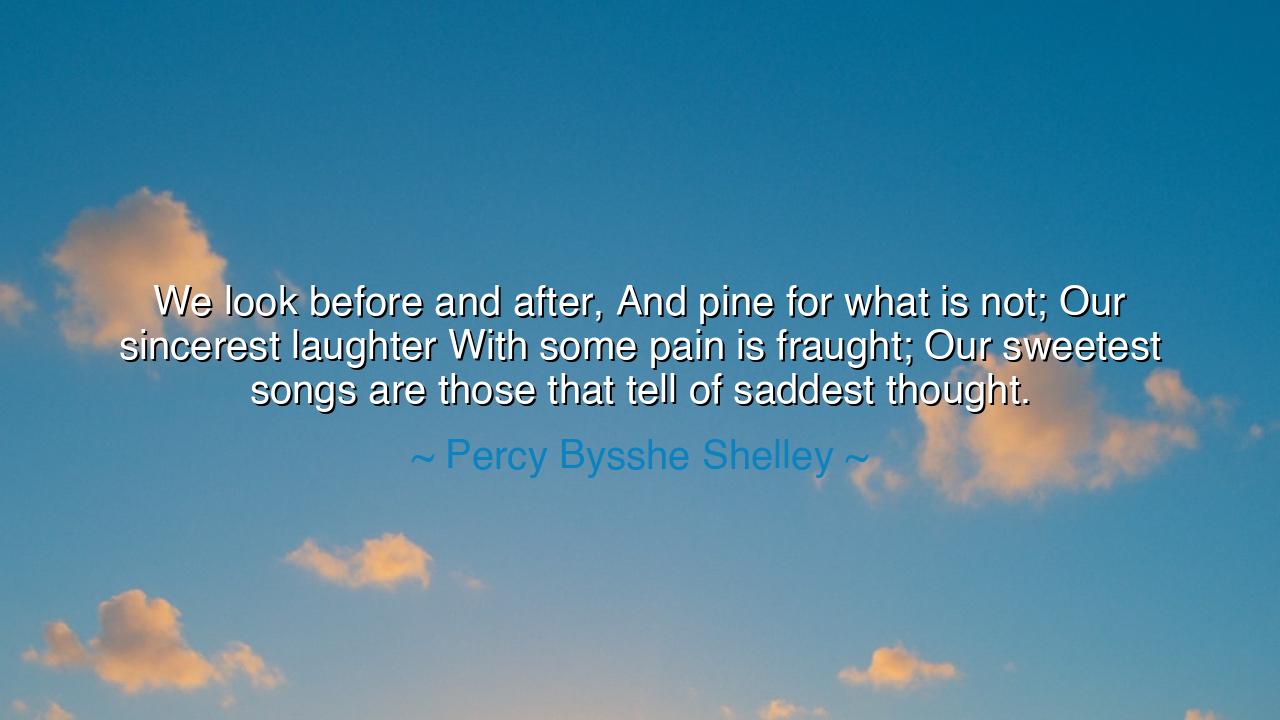
We look before and after, And pine for what is not; Our sincerest
We look before and after, And pine for what is not; Our sincerest laughter With some pain is fraught; Our sweetest songs are those that tell of saddest thought.






The great Romantic poet Percy Bysshe Shelley, whose soul burned with both fire and sorrow, once wrote: “We look before and after, and pine for what is not; our sincerest laughter with some pain is fraught; our sweetest songs are those that tell of saddest thought.” These lines, drawn from his poem “To a Skylark,” are among the most haunting expressions of the human condition ever set to verse. In them, Shelley speaks not only as a poet but as a prophet of the heart, unveiling the eternal truth that joy and sorrow are woven together, and that the most beautiful expressions of life are often born from the ache of longing.
The origin of this quote lies in Shelley’s meditation on the skylark, a bird whose song he described as pure, effortless, and divine—untouched by the melancholy that burdens human hearts. The bird sings for the joy of existence itself, while man, bound by memory and desire, sings through the veil of sorrow. Thus Shelley contrasts the innocence of nature with the complexity of human consciousness. “We look before and after,” he writes, because we are haunted by time—remembering what has been lost and yearning for what has not yet come. We are creatures of reflection and imagination, but these gifts, which make us noble, also make us restless.
In this restlessness, Shelley finds the essence of human tragedy—and also its beauty. For even our laughter, he says, “is fraught with pain.” We laugh to forget, yet even in joy there is the faint echo of impermanence. The sweetest songs, those that move us most deeply, are not those that celebrate easy pleasure, but those that speak of sorrow, of the tenderness of loss, of the fragility of life. The heart, when wounded, gains depth; and from that depth flows art, compassion, and wisdom. In this way, Shelley teaches that sadness is not an enemy to be feared, but a companion that gives meaning to joy.
Consider the story of Ludwig van Beethoven, who, though deaf in his later years, composed some of the most transcendent music the world has ever heard. His Ninth Symphony, with its glorious Ode to Joy, was written by a man who could not hear a single note of it. What irony, and what majesty! His joy was not born from ease, but from the overcoming of despair. His music, like Shelley’s poetry, reminds us that the greatest beauty often rises from suffering, that the purest harmony is that which is forged in the fires of struggle.
Shelley’s vision, though melancholy, is not hopeless. It is, rather, profoundly human. For to feel sorrow is to be alive; to long is to love. Our “pining for what is not” reveals the infinite capacity of the human heart—to dream, to imagine, to reach beyond the limits of our brief existence. This longing is the birthplace of art, faith, and transcendence. The skylark may sing without sadness, but its song is simple. Humanity’s song, though burdened with pain, reaches the heavens. For we sing not only of what is, but of what might be—and that, Shelley reminds us, is the mark of divinity within us.
The lesson of Shelley’s words is this: do not flee from sorrow. Do not curse the ache of memory or the longing for what has not yet come. Instead, see in them the proof of your soul’s vastness. Your pain is not weakness—it is sensitivity to the eternal. To feel deeply is to live deeply; to mourn is to love without end. If you would create beauty, if you would know truth, you must first open your heart to the full measure of joy and grief alike.
So, my friend, when laughter trembles with tears, or when your heart aches for what is lost, remember the wisdom of Percy Bysshe Shelley. Accept the duality of your nature. Let your sadness refine your spirit as rain refines the soil. For in the end, it is not unbroken happiness that makes life beautiful—it is the harmony between joy and sorrow, the way light and shadow together give shape to all that we hold dear. And as the skylark sings freely in the air, so may your own soul, through both pain and wonder, find its song—and offer it, pure and eternal, to the world.






AAdministratorAdministrator
Welcome, honored guests. Please leave a comment, we will respond soon